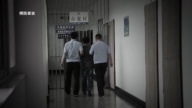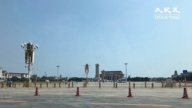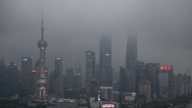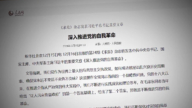【新唐人2013年12月18日訊】中國大陸的三峽工程,號稱是世界上最大的水利工程,但遺留的問題眾多,目前面臨重重危機。日前,中共媒體針對外界普遍抨擊的三峽工程,所帶來的諸多弊端與危害,作了辯解,但立即遭到專家和民眾們的吐槽和質疑。
日前,大陸各大門戶網站,紛紛轉載中共喉舌《新華網》的一篇有關三峽工程問題的文章,文中針對三峽工程帶來的八大「焦點問題」一一作了辯解。
這八大問題包括:泥沙淤積埋大壩﹔地質災害多發﹔蓄水誘發地震﹔高壩阻斷環流路﹔兩湖喊渴伏危機﹔珍稀物種面臨滅絕﹔三峽大壩船閘把黃金水道攔腰截斷,使得大批過壩船舶被迫長時間待閘﹔和壩下的河流,因泄洪沖刷岸坡變陡,「崩岸」現象日趨嚴重等。
針對上述問題,外界質疑,媒體避重就輕,列舉有關管理部門採取的一些效果有限的應對措施,卻迴避問題帶來的嚴重後果。
外界認為,雖然當局表面承認三峽工程存在的相關問題,但對三峽工程造成的實際危害,陳述時卻盡量減輕程度或縮小范圍,只字不提如果問題繼續惡化可能帶來的惡果。
據公開的資料顯示,三峽工程在移民、生態環境、地質災害等方面,引起的問題日趨嚴重。而專家們也注意到三峽工程所引發的諸多嚴重問題。
旅居德國的中國水利專家王維洛曾對媒體表示,三峽工程是中共盡力摁住的一個火藥桶,隨時可能爆發。
王維洛:「當年的黃萬里先生有一個觀點,說辛亥革命是從四川保路運動開始的,而三峽工程是中共政府花最大的錢盡力摁住的火藥桶,這個火藥桶很可能隨時都會爆發。」
中國民間水專家張俊峰:「從我對三峽水庫的認識來看,我覺得他在很短暫的時間之內,去把一個地質很脆弱的地區蓄滿了水,這樣一個作用的話,勢必從生態系統,從整個的自然變化系統,相當於一個衝擊。而這種衝擊,一定會對自然體系造成其他的連鎖的影響。」
最初興建三峽工程的四個目標是:防洪、發電、航運、南水北調。但是最終只實現了一個目標,那就是發電。然而,三峽工程的電並沒有照亮半個中國,目前三峽工程的發電量不足全中國發電量的百分之三。
中國環保活動人士戴晴:「那麼,現在20多年過去了,我們看到防洪幾乎是沒有任何效果,基本上起的是礙航的作用,可能有(負責三峽)移民的官員從國家的撥款裡得到了幸福,甚至於富起來了。將近200萬移民沒有幸福可言。」
而近年來,不斷看到三峽工程給人們帶來的後患。
2004年冬,荊江長江干堤發生多處崩岸﹔2006年春傳來岳陽長江干堤發生嚴重崩岸,湖南省水利廳負責人緊急赴京向水利部和國家防總匯報險情。
此外,三峽地區儀器可測到的地震次數明顯增加。雖然到現在為止還沒有發生破壞性的地震,但是地震專家認為,三峽地區有可能發生六級或六點五級地震。
今年7月以來,中國南方上海、浙江、湖南、貴州等多個省份,至少超過40個城市,氣溫超過攝氏40度,其中,浙江省奉化市最高氣溫已經突破攝氏43度,連續一週蟬聯中國「高溫之冠」,老百姓叫苦連天。不少分析人士認為,高溫與「三峽」大壩攔水和南水北調有關。
中國物理學教授錢偉長,早在1991年,就在報刊上撰文有關海灣戰爭和三峽大壩建設的安全關係。他說,三峽水庫潰壩的危害,將使長江下游六省市成為澤國,幾億人將陷入絕境。
而時事評論員林子旭早前也對《新唐人》表示,中共耗鉅資興建的三峽工程,卻是在三峽下游成千上萬的民眾頭上,懸的一把隨時可能落下來的閘刀。
採訪編輯/常春 後製/李勇
Chinese State Media Defend Three Gorges Dam Disasters
China’s Three Gorges Dam is the world’s largest
hydropower project, and has faced many problems.
The Chinese Communist Party (CCP) has faced many
criticisms over disasters associated with the project.
State-controlled media recently published an article
defending the dam project, immediately drawing
further debate from environmentalists and experts.
Xinhua News Agency recently published an
article explaining CCP measures to target eight
common criticisms of the Three Gorges Dam.
The eight criticisms are;
reservoir sedimentation;
multiple geological disasters;
reservoir-induced seismic activity;
disrupting the Yangtze river system; drying up
of nearby lakes; extinction of rare species;
sluice gates blocking boat access; and
riverbank erosion causing landslides.
Xinhua’s article is criticized for ignoring the consequences,
by stating only the measures taken by the authorities.
The CCP regime acknowledged the disasters
associated with the Three Gorges Dam.
However, it argued that these consequential disasters
were avoided, and so the damage was minimized.
Public observations have indicated that the
Three Gorges Dam is a model for disasters.
It has displaced millions of people, and caused
environmental and geological devastation.
Water expert Wang Vero once described to media that
the Three Gorges Dam is like a barrel of gunpowder.
It could blow up at any time.
Wang Vero reflected on what
engineer Huang Wanli expressed.
The Railway Protection Movement in Sichuan
ignited the Chinese revolution in 1911.
The Three Gorges Dam, however, is a barrel
of gunpowder that the regime has spent a lot
of money to suppress consequential criticism.
Wang thinks it could blow up at any time.
Zhang Junfeng, environmentalist: “My understanding
of the Three Gorges Reservoir is that the weight of
water in the reservoir is sitting on a geologically fragile
region, and has a major impact on the entire ecosystem.
This will cause a serious chain reaction.”
The Three Gorges Dam was constructed
with four claims; that it would control floods,
generate power, and navigate and divert water.
So far, only one has been realized, that of power generation.
However, this generated power
did not illuminate half of China.
The power capacity of the dam covers less than
three percent of China’s energy requirements.
Dai Qing, environmentalist: “So now, 20 years later,
we see nearly a zero effect on flood mitigation.
It basically played the role of ‘water navigation interrupter’.
Officials may get rich and happy using the
budgets intended to be used to relocate residents.
The two million migrants do not have the same opportunity.”
People have faced much devastation in recent years,
as a direct consequence of the Three Gorges Dam.
In the winter of 2004, the riverbank collapsed at multiple
points along the Jing River dam, part of the Yangtze river.
In Spring 2006, a Hunan official
filed an emergency report in Beijing.
It referred to a severe collapse of parts of the riverbank
near a dam on the Yangtze River, in Hunan province.
In addition, significant increases in seismic activity
has been detected within the reservoir region.
There have been no major earthquakes, but experts
anticipate an quake of 6 or 6.5 on the Richter scale.
Since July this year, more than 40 cities in southern
China have experienced temperatures of over 40 degrees.
This includes Shanghai, as well as
cities in Zhejiang, Hunan, and Guizhou.
In particularly, Fenghua City of Zhejiang had
a record high of 43 degrees for a whole week.
This abnormality is believed to be associated
with the construction of the Three Gorges Dam
and the associated water diversion project.
Physicist Chien Wei-zang commented about the
safety of the Three Gorges Dam in a 1991 article.
He wrote that the collapse of the Three Gorges Dam
will bury six Provinces along the Yangtze River.
It would leave hundreds of millions of people in dire straits.
Commentator Lin Zixu has previously described to
NTD Television about the multi billion Yuan project.
Lin sees it as a guillotine the CCP regime has raised
above millions of Chinese peoples heads downstream.
Interview & Edit/Changchun Post-Production/LiYong




























